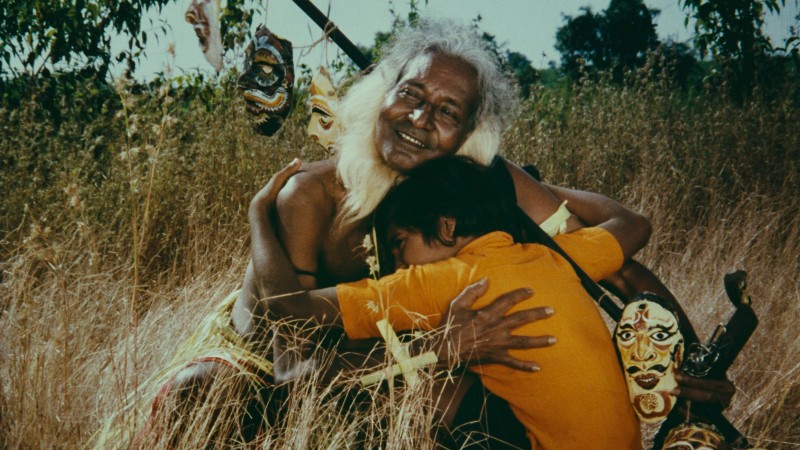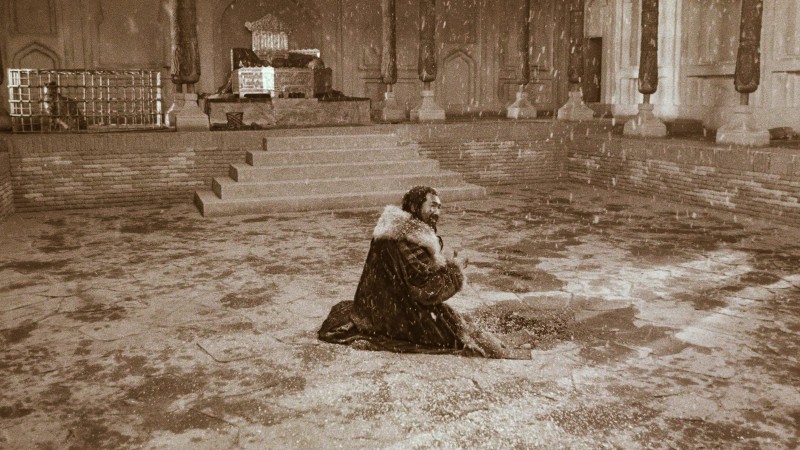Phoenix: Just Be Yourself

Christian Petzold’s exquisitely crafted 2014 drama Phoenix, set in post–World War II Germany, is haunted in many ways, starting with its music—that is to say, its central theme, Kurt Weill’s delicate 1943 ballad “Speak Low.” This leitmotif is first heard as a gentle bass and piano piece, in a minimalist jazz score over the opening credits; it later turns up on a phonograph recording, in an instrumental version played at a nightclub, and, finally, in a climactic performance by the film’s main character. By the time this occurs, and we are able to fully hear poet Ogden Nash’s poignant autumnal lyrics, which honor the triumph of love even as they acknowledge its inevitable decay (“Time is so old and love so brief / Love is pure gold and time a thief”), the song has become inseparable from the film’s rhythms and emotional essence, as though it has been welling up uncontrollably from the story’s dark interior. It’s worth noting that Weill was a Jew who fled Nazi Germany in 1933 for Paris, before moving to London and then New York, where he spent the rest of his life—for Phoenix is a German film preoccupied with how war forever changes personal and national identities.
Phoenix’s use of Weill’s standard is reminiscent of the use of Weill’s heartrending “September Song” in William Dieterle’s underseen Hollywood drama September Affair (1950). In that film, Weill’s music speaks to the irresolvable ache at the center of Joseph Cotten and Joan Fontaine’s ethereal romance, which begins when they are both presumed dead after the plane they were supposed to be on crashes. It’s a classical move, employing a popular song to subtly strike a particular chord with viewers, and it is especially effective in melodrama, an inherently melodious genre, unashamed of flourish. Just try to picture the swooning romance in Ghost functioning at all without the recurring “Unchained Melody” theme. Love stories move to a particular internal rhythm.
Phoenix isn’t really a love story, but it does tell of a doomed relationship between a woman and a man, their predicament so far-fetched that it can really be legible only in the realm of metaphor. The film’s basic stylistic realism is provocatively at odds with its purposely preposterous story; a throwback at once to the luxurious American melodramas of the forties and fifties and to postwar European filmmaking, haunted by the new realities of a ravaged, upside-down world, this gorgeously odd picture plays like a cross between Alfred Hitchcock’s Vertigo and Roberto Rossellini’s Stromboli,with a dash of John Frankenheimer’s Seconds—communicated, crucially, through the specific experience of Jewish-German identity. Miraculously, the film feels purely emotional rather than heady or mannered, its contrivances employed to supremely satisfying ends.
Petzold’s work has long been defined by tensions between the real and the artificial. In 1989, the year the Berlin Wall fell, he entered the German Film and Television Academy in Berlin, one of the schools founded in response to the 1962 Oberhausen Manifesto, the artists’ statement that ultimately led to the politically minded New German Cinema that flourished in the seventies. There, he met the teacher and experimental documentarian Harun Farocki, a peripheral New German Cinema figure who would become a major influence and collaborator of his. Petzold made movies for German television throughout the nineties, but it was at the turn of the millennium that he truly found his calling as a filmmaker. His 2000 breakthrough The State I Am In was a huge success and marked a coming to prominence of the aesthetically ambitious, often politically minded Berlin School, a movement that had been emerging over the previous few years and is now considered the most important development in German filmmaking of the past three decades. Like the New German Cinema before it, the Berlin School was a response to the state of the national industry—whose output was, in the nineties, a mostly unremarkable run of comedies and other feel-good entertainments. The Berlin School’s practitioners, also including Angela Schanelec (Marseille) and Ulrich Köhler (Sleeping Sickness), are united by their visual austerity and rejection of overt narrative manipulation, as well as their engagement with their country’s political past and present.
Petzold stands somewhat apart from the other filmmakers in the group, however, in that he does employ established narrative conventions, albeit subtly. The State I Am In, which centers on a pair of former left-wing terrorists (echoes of the Baader-Meinhof Gang) who are trying to raise a teenage daughter while on the run, is something of a political suspense thriller; 2007’s Yella, modeled on the 1962 cult film Carnival of Souls, riffs on the horror genre; 2008’s Jerichow, a variation on The Postman Always Rings Twice, is a romantic noir. In an interview published in 2013, he said, “I wanted to rediscover genre; I did not want to destroy it, therefore not deconstruct it, rather reconstruct it.” With Phoenix, Petzold is harnessing the effects of melodrama, wielding them with such precision and psychological acuity that the essential ludicrousness of the story reads as plausible. One has to imagine something like Douglas Sirk’s harebrained Magnificent Obsession recast in a gloomy realist aesthetic in order to grasp this film’s fascinating emotional tenor.
Phoenix , adapted from a Hubert Monteilhet novel by Petzold and Farocki (who died in 2014), amply rewards viewers for suspending their disbelief. Here’s how it goes: a Jewish woman, Nelly (the mesmerizing Nina Hoss, a regular collaborator of Petzold’s), returns to Berlin from Switzerland, after surviving Auschwitz, not long after the end of the war. When we first see her, passing through an American-operated Swiss-German border checkpoint at night, her face is hidden behind bloody bandages that make her look like the Invisible Man, or The Tenant’s pathetic, wailing Simone Choule. She is riding in a car driven by her friend Lene (Nina Kunzendorf), a Jewish woman who left Germany for London before the war, and who is now helping Nelly try to return to some semblance of her former life. With her entire family dead, her gentile husband having abandoned her, and her face disfigured, Nelly is essentially without identity. As the film will go on to demonstrate, however, identity is never fixed. Does Nelly consider herself a German or a Jew? Is she her own person or somebody’s wife? Underlining her essential malleability, she will undergo a hospital operation that leaves her with a new face.
Once she finally emerges from her bandages (in an uncommon cinematic move, Petzold chooses not to give us any kind of dramatic reveal scene), Nelly is so unrecognizable that when she tracks down her husband—Johannes, called Johnny (Ronald Zehrfeld)—even he doesn’t know it’s her. According to Lene, however, Nelly should banish all thought of reconnecting with Johnny, a pianist who used to accompany her when she worked as a cabaret singer; her friend claims he betrayed her to the Nazis and divorced her behind her back after she was taken to the camps. Furthermore, Lene is trying to persuade Nelly to join her in Haifa, Palestine, where, as Jews, they will be given land as part of the movement leading up to the creation of a Jewish state. Despite her friend’s insistence that they relocate, Nelly is drawn into matters of personal rather than social identity, and goes in search of her unworthy husband. She approaches him near the nightclub where he still plays; it’s named the Phoenix, but it has barely risen from the ashes—it’s hidden in a rubble-strewn alley, an economically but vividly designed set, shot by Petzold’s regular cinematographer Hans Fromm with evocative noirish lighting. Johnny is immediately struck by Nelly. Although he does not recognize her as his wife, there is something ineffably familiar about her, and this quality leads him to try to pull her into a scheme—posing as Nelly so that she can collect her own inheritance.
As a film about a double who isn’t really a double, Phoenix can hardly avoid conjuring thoughts of Vertigo , whose influence on Petzold had already been established—his first collaboration with Hoss, the 2001 made-for-television film Something to Remind Me, was also inspired by Hitchcock’s film. (The Master of Suspense was on Petzold’s mind from the beginning of his career, in fact; he has said that his 1995 debut film, Pilotinnen, also made for television, was a variation on The 39 Steps.) Yet Phoenix doesn’t just pay homage to Hollywood cinema’s ultimate dream film, it also plays with its conventions, crucially by taking the point of view of the knowing woman rather than the duped man. Various tensions energize Petzold’s film, some of them narrative-based: Does Nelly want to simply reconnect with Johnny or to exact revenge? How and when will Johnny find out the truth about his supposedly counterfeit wife? Other tensions are of a more spiritual nature: When will Nelly accept the possibility of a future untethered to her past? How will she truly identify herself? All of this is in aid of a story that is at its core about the lies we tell to ourselves, and about ourselves, so that we can function within societal structures—issues made all the more urgent by the film’s traumatic historical period.
As a marriage reconstruction drama, Phoenix is stingingly ironic: we hope that Nelly and Johnny can truthfully reconnect with each other only so that she can ultimately punish him. As Johnny “teaches” Nelly to be like Nelly, we become increasingly aware of the brute he must have been in their relationship before the war. He instructs her to repeatedly enter the door of his shabby basement apartment so that she may learn how to walk more like herself; he teaches her to imitate her own handwriting; and finally, in the film’s most Vertigo-like scene, he forces her to get herself up like the glamorous Nelly he knew, with shoes and a dress from Paris. In one of the film’s sliest and subtlest conceits, the more Nelly enacts this false return to her “true” self, the further she gets from the person she once was. And this is the key to Hoss’s magnificent, tremulous performance: at every moment, she appears to be emotionally free-falling, while feverishly sorting through layers of meaning and truth about herself, her husband, and her home country—all communicated via the slightest flickers of recognition on her beautiful, bruised face.
This is Hoss’s sixth film with Petzold, and the way her restrained intensity effortlessly matches the director’s understated melodrama helps make Phoenix feel as much a character study as a high-concept drama about postwar identity. The savvy Petzold walks a tightrope throughout, keeping his outlandish premise emotionally authentic and his several layers of fabricated reality clearly delineated. Just as Nelly grows aware of herself as a construction, the film acknowledges its own basis as melodrama; a gun is even introduced early on, although the viewer should probably take Lene’s advice as she hands it to Nelly as a message from the filmmaker: “Sometimes just showing it is enough.” As the film reaches its final act, imminent violence hangs in the air; there’s even a moment in which Johnny threatens to scar Nelly, which, given the context, is quite shocking. Yet Petzold’s ending, a masterful shot-reverse-shot sequence of escalating disquiet, fueled by that final performance of “Speak Low,” cuts to the quick in a manner far more satisfying than any bloodletting could ever be.




